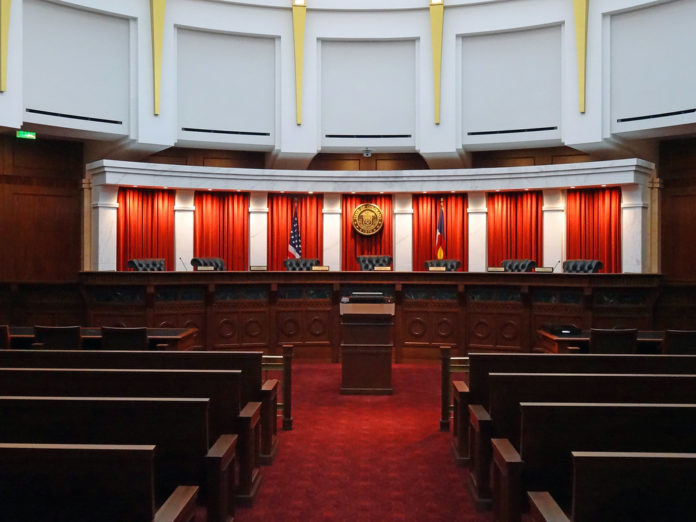
The Colorado Supreme Court will hear oral arguments in four criminal cases on Nov. 8. The cases raise questions about a defendant’s obligation to pay restitution beyond the grave and whether an apartment resident is immune from prosecution for shooting an intruder in the shared basement of his building.
People v. Johnson
In the first case before the court on Monday, the justices will consider whether a defendant who has died must pay restitution.
Eddie Johnson was convicted of securities fraud and theft. He died while awaiting a decision from the Court of Appeals, and his attorney notified the court the defendant had died.
The attorney asked the court to erase Johnson’s conviction and six-figure restitution order under the abatement ab initio doctrine. According to the doctrine, if a criminal defendant dies while their appeal is pending, their conviction is vacated. The state objected, arguing that the state legislature intended restitution obligations to survive beyond the defendant’s death.
The Court of Appeals sided with Johnson, finding that the doctrine extinguishes everything associated with a case, including restitution, as if the defendant had never been indicted or convicted.
In its appeal, the state says the Supreme Court should abandon or modify the abatement ab initio doctrine when it comes to restitution because it deprives crime victims of their right to be made whole and allows the defendant’s estate to keep ill-gotten gains.
People v. Gilbert
Palmer Gilbert was sitting in a car that didn’t belong to him in a Best Buy parking lot when a store employee approached him. After the two exchanged words, Gilbert exited the car while swinging a knife. He then fled on foot and stole or attempted to steal three different cars by threatening their occupants with the knife. Gilbert fled in one of the stolen cars, crashed, stole a truck and was found in Wyoming a week later.
Gilbert pleaded not guilty. A motions hearing was set for February 2018 with a trial to follow in April. The day before the motions hearing, Gilbert’s attorney filed a notice of intent to present evidence of the defendant’s mental condition. Typically, this notice must be given at arraignment or prior to trial with good cause. To present evidence of his mental state at trial, a defendant must undergo a mental health examination. Gilbert asked the trial court to order the examination and vacate the trial date to allow time for it.
The district court denied Gilbert’s requests, finding he hadn’t shown good cause for his late filing of notice. The Court of Appeals reversed, concluding that a party shows good cause if the notice was late due to mistake, ignorance or inadvertence and when justice is best served by allowing the evidence. The appellate court found Gilbert demonstrated good cause.
The Supreme Court will hear the case to consider whether the district court abused its discretion in concluding Gilbert lacked good cause for his untimely filing of notice. The justices will also consider whether the Court of Appeals erred in remanding the case for further findings.
Garcia v. People
Nicholas Garcia, Jr. and Daniel Kaehne began their night in Black Hawk and ended it in Denver. They don’t agree on what happened in between, but a jury found Garcia guilty of kidnapping and assaulting Kaehne that night, along with robbery and menacing.
The trial court initially instructed the jurors that second-degree kidnapping is when someone knowingly seizes and carries any person from one place to another without consent or lawful justification.
Garcia maintains the trial court erred by providing a supplemental jury instruction that defined “seized and carried” as “any movement, however short in distance.” On appeal, he argued the court’s instruction renders the word “seizes” meaningless and negates the phrase “from one place to another.” The Court of Appeals affirmed his conviction.
The Colorado Supreme Court will consider whether the Court of Appeals erred in upholding the supplemental jury instruction.
People v. Rau
In the final case to be heard Monday, the justices will consider whether the shared basement of an apartment building constitutes a “dwelling” for the purposes of Colorado’s “make my day” law.
Patrick Rau and his girlfriend lived in a house that had been split into multiple apartments, all of which shared access to the house’s basement. In early 2017, Rau’s girlfriend noticed the basement door of their apartment was ajar, and Rau armed himself with a gun to investigate.
Rau found a man sleeping in the basement and told the man to leave. The man started yelling and throwing things, though not at Rau. Rau told the man that if he didn’t leave by the time he counted to five, he would shoot him. Rau counted to five and shot the man.
Rau was charged with second-degree murder, but the district court found him immune under the state’s “make my day” statute, which protects an occupant of a dwelling from prosecution if the occupant uses deadly physical force against an intruder.
The state appealed, arguing that the basement wasn’t a “dwelling” because it was a common area used by all the building’s tenants. However, the Court of Appeals disagreed, finding that the state’s interpretation is at odds with the Colorado Supreme Court’s 1982 decision in People v. Jimenez, which doesn’t make an exception for common areas within a dwelling.

